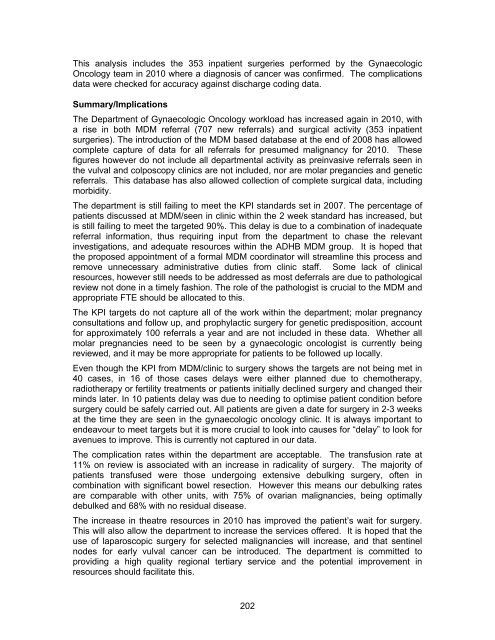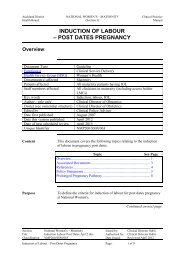National Women's Annual Clinical Report 2010
National Women's Annual Clinical Report 2010
National Women's Annual Clinical Report 2010
Create successful ePaper yourself
Turn your PDF publications into a flip-book with our unique Google optimized e-Paper software.
This analysis includes the 353 inpatient surgeries performed by the Gynaecologic<br />
Oncology team in <strong>2010</strong> where a diagnosis of cancer was confirmed. The complications<br />
data were checked for accuracy against discharge coding data.<br />
Summary/Implications<br />
The Department of Gynaecologic Oncology workload has increased again in <strong>2010</strong>, with<br />
a rise in both MDM referral (707 new referrals) and surgical activity (353 inpatient<br />
surgeries). The introduction of the MDM based database at the end of 2008 has allowed<br />
complete capture of data for all referrals for presumed malignancy for <strong>2010</strong>. These<br />
figures however do not include all departmental activity as preinvasive referrals seen in<br />
the vulval and colposcopy clinics are not included, nor are molar pregancies and genetic<br />
referrals. This database has also allowed collection of complete surgical data, including<br />
morbidity.<br />
The department is still failing to meet the KPI standards set in 2007. The percentage of<br />
patients discussed at MDM/seen in clinic within the 2 week standard has increased, but<br />
is still failing to meet the targeted 90%. This delay is due to a combination of inadequate<br />
referral information, thus requiring input from the department to chase the relevant<br />
investigations, and adequate resources within the ADHB MDM group. It is hoped that<br />
the proposed appointment of a formal MDM coordinator will streamline this process and<br />
remove unnecessary administrative duties from clinic staff. Some lack of clinical<br />
resources, however still needs to be addressed as most deferrals are due to pathological<br />
review not done in a timely fashion. The role of the pathologist is crucial to the MDM and<br />
appropriate FTE should be allocated to this.<br />
The KPI targets do not capture all of the work within the department; molar pregnancy<br />
consultations and follow up, and prophylactic surgery for genetic predisposition, account<br />
for approximately 100 referrals a year and are not included in these data. Whether all<br />
molar pregnancies need to be seen by a gynaecologic oncologist is currently being<br />
reviewed, and it may be more appropriate for patients to be followed up locally.<br />
Even though the KPI from MDM/clinic to surgery shows the targets are not being met in<br />
40 cases, in 16 of those cases delays were either planned due to chemotherapy,<br />
radiotherapy or fertility treatments or patients initially declined surgery and changed their<br />
minds later. In 10 patients delay was due to needing to optimise patient condition before<br />
surgery could be safely carried out. All patients are given a date for surgery in 2-3 weeks<br />
at the time they are seen in the gynaecologic oncology clinic. It is always important to<br />
endeavour to meet targets but it is more crucial to look into causes for “delay” to look for<br />
avenues to improve. This is currently not captured in our data.<br />
The complication rates within the department are acceptable. The transfusion rate at<br />
11% on review is associated with an increase in radicality of surgery. The majority of<br />
patients transfused were those undergoing extensive debulking surgery, often in<br />
combination with significant bowel resection. However this means our debulking rates<br />
are comparable with other units, with 75% of ovarian malignancies, being optimally<br />
debulked and 68% with no residual disease.<br />
The increase in theatre resources in <strong>2010</strong> has improved the patient’s wait for surgery.<br />
This will also allow the department to increase the services offered. It is hoped that the<br />
use of laparoscopic surgery for selected malignancies will increase, and that sentinel<br />
nodes for early vulval cancer can be introduced. The department is committed to<br />
providing a high quality regional tertiary service and the potential improvement in<br />
resources should facilitate this.<br />
202
















